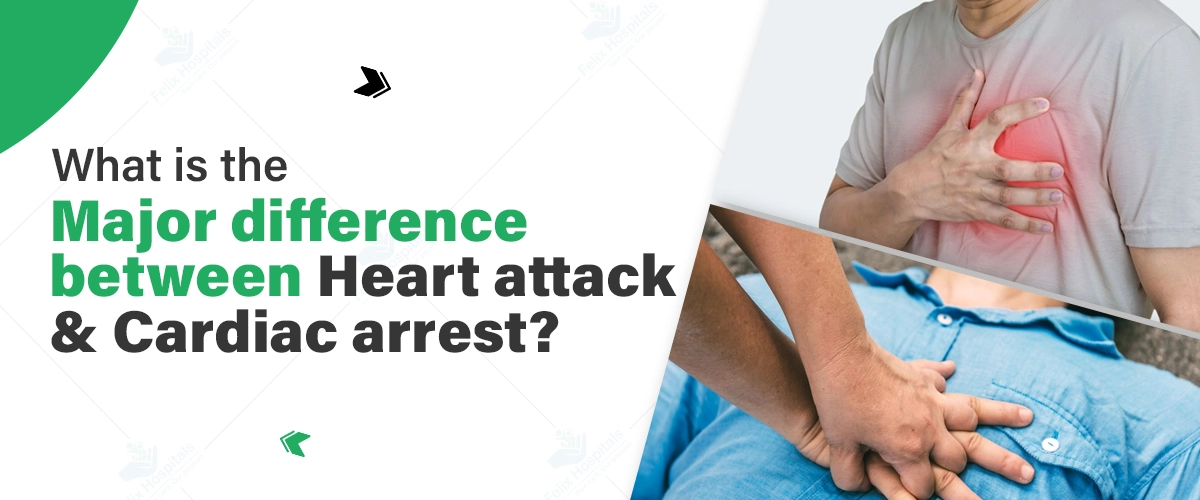
Subscribe to our

Heart health issues are among the leading causes of death worldwide, and two of the most critical conditions affecting the heart are heart attacks and cardiac arrests. While both are severe, they are distinct events that require different responses. Understanding the difference between a heart attack and cardiac arrest is crucial for prompt and effective medical intervention. Recognizing these differences can save lives, whether at home, at work, or seeking care at the best heart hospital in Noida. In this blog, we’ll explore the major differences between these two life-threatening conditions and why acting quickly can make all the difference.
Protect your heart and live a longer, healthier life by making informed decisions today by calling +91 9667064100.
A heart attack occurs when blood flow to a part of the heart muscle is blocked, typically due to a clot in one of the coronary arteries. This blockage prevents oxygen-rich blood from reaching the heart, causing the tissue to become damaged or die. The heart’s ability to pump effectively can be compromised, but it doesn't stop immediately.
Cardiac arrest, on the other hand, is a sudden and complete cessation of the heart’s ability to beat effectively, often due to a malfunction in the heart’s electrical system. This causes the heart to stop pumping blood to vital organs, including the brain, leading to loss of consciousness and, if untreated, death.
How Cardiac Arrest Occurs: Cardiac arrest is typically caused by arrhythmias (irregular heartbeats) such as ventricular fibrillation, where the heart’s electrical signals become disorganized.
Heart Attack: Caused by a blocked artery that restricts blood flow to the heart muscle.
Cardiac Arrest: Caused by an electrical malfunction, disrupting the heart’s rhythm.
Heart Attack: Gradual onset, typically characterized by chest pain, discomfort, and shortness of breath.
Cardiac Arrest: Sudden onset with the person losing consciousness, no pulse, and no breathing.
Heart Attack: Treated with medications, angioplasty, stents, and sometimes surgery.
Cardiac Arrest: Treated immediately with CPR and defibrillation.
Heart Attack: Can cause damage to the heart muscle, but without immediate cardiac arrest, the person may survive.
Cardiac Arrest: A life-threatening emergency that requires immediate intervention to restore heart rhythm.
A heart attack can lead to cardiac arrest. When blood flow is blocked during a heart attack, it can result in electrical disturbances in the heart, potentially leading to arrhythmias that cause the heart to stop beating. According to studies, heart attacks are among the most common causes of cardiac arrest, highlighting the critical importance of early medical intervention.
Both conditions can be prevented or their risk minimized with certain lifestyle changes:
Medications: Aspirin, statins, and beta-blockers can help manage risk factors. In some cases, a pacemaker or defibrillator may be implanted to regulate the heart’s rhythm.
The Importance of CPR: Knowing CPR is critical for anyone witnessing cardiac arrest vs heart attack situations. Immediate CPR can double the chances of survival from cardiac arrest until emergency services arrive.
When in doubt about your heart health or if you experience any symptoms of a heart attack vs cardiac arrest, it’s important to consult the best cardiologists. Felix Hospitals, one of the leading heart hospitals in Noida, offers expert care to help identify risks and treat heart conditions early. Dr. Rahul Arora, and Dr. Virendra Singh are experienced specialists who can guide you through the necessary steps to protect your heart and improve your overall health. A visit to one of these heart experts will help you understand what changes you need to make to safeguard your heart.
Both conditions require swift action, so knowing the differences between cardiac arrest vs heart attack can save a life.
Understand the warning signs of heart attacks and cardiac arrest, and schedule regular heart check-ups by Clicking Here.
In conclusion, while cardiac arrest vs heart attack are often used interchangeably, they are fundamentally different events that require distinct approaches. Cardiac arrest is a sudden, life-threatening emergency caused by electrical failure, whereas a heart attack results from a blocked artery and can lead to long-term heart damage. Understanding the differences and being able to act quickly can mean the difference between life and death.
Being informed about these conditions, including the potential costs of heart attack surgery and the importance of timely intervention, is essential for heart health. Take steps to reduce your risk, stay vigilant for symptoms, and always seek professional advice from experts at top hospitals like Felix Hospitals, Noida.
Q1- Can a heart attack lead to cardiac arrest?
ANS: Yes, a heart attack can cause electrical disturbances in the heart, leading to cardiac arrest if not treated promptly.
Q2- What’s the main difference between heart attack and cardiac arrest symptoms?
ANS: A heart attack involves gradual chest pain, shortness of breath, and discomfort, while cardiac arrest causes sudden loss of consciousness and no pulse.
Q3- Is CPR effective during a heart attack?
ANS: CPR is critical in cardiac arrest situations but not usually needed for a heart attack unless it leads to cardiac arrest.
Q4- Can heart disease be prevented without medication?
ANS: Yes, lifestyle changes like a healthy diet, regular exercise, and not smoking can significantly reduce the risk of heart disease.
Q5- What immediate action should I take if someone has a cardiac arrest?
ANS: Perform CPR immediately and use a defibrillator if available to restore the heart’s rhythm.
Q6- How can I reduce my risk of having a heart attack or cardiac arrest?
ANS: Maintain a healthy weight, exercise, quit smoking, and monitor your blood pressure and cholesterol levels regularly.
Q7- Do heart attacks always require surgery?
ANS: Not always; heart attacks may be treated with medications, angioplasty, or stents, but surgery may be necessary in severe cases.